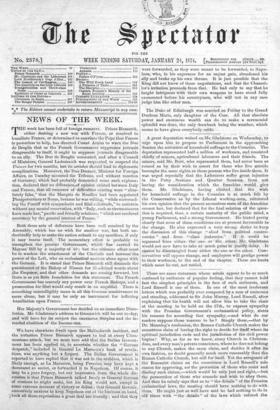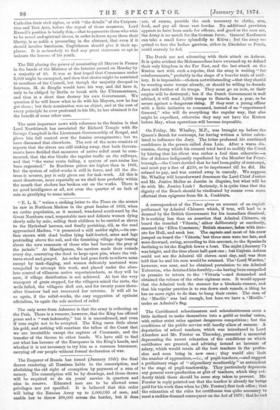There are some statesmen whose minds appear to be so
much confused by outbursts of popular feeling, that they cannot hold fast the simplest principles in the face of such outbursts, and Lord Russell is one of them. In one of the most irrelevant letters which was probably ever composed by a man of eminence and standing, addressed to Sir John Murray, Lord Russell, after explaining that his health will not allow him to take the chair at the meeting to be held on the 27th, to express sympathy with the Prussian Government's ecclesiastical policy, states his reasons for according that sympathy,—and what do our readers suppose those reasons-.to be ? Simply these,—that by Dr. Manning's confession, the Roman Catholic Church makes the monstrous claim of having the right to decide for itself where its Spiritual jurisdiction ends and the jurisdiction of the civil power begins ! Why, as far as we know, every Church in Christen- dom, and every man's private conscience, where he does not belong to any. Church, makes the same claim, and decides it after its own fashion, no doubt generally much more reasonably than the Roman Catholic Church, but still for_itself. Yet the arrogance of the Romanist claims on the conscience is Lord Russell's solo reason for approving, not the protection of those who resist and disobey such claims,—which would be only just and right,—but the persecution of those who concede and wish to obey them. And then he calmly says that as to " the details" of the Prussian ecclesiastical laws, the meeting should have nothing to do with them. He might just as well have said ho had nothing to do in old times with "the details" of the laws which refused the
Catholics their civil rights, or with "the details" of the Corpora- tion and Test Acts, before the repeal of those measures. Lord Russell's position is briefly this,—that to persecute those who wish to be moral and spiritual slaves, in order to force upon them their liberty, is so noble a proceeding in the abstract, that even if it should involve harshness, Englishmen should give it their ap- plause. It is melancholy to find any great statesman so apt to unlearn the lessons of his youth.



































